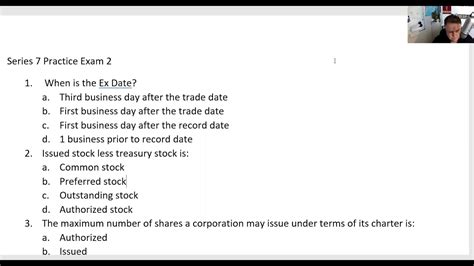Prepare for your Series 7 exam with these comprehensive practice questions. Covering a wide range of topics, these questions will help you assess your knowledge and identify areas for improvement.

Securities Markets and Products
1. Which type of security represents ownership in a company?
(A) Bond
(B) Stock
(C) Option
(D) Mutual fund
2. What is the primary function of a mutual fund?
(A) To provide income to investors
(B) To offer diversification
(C) To protect against inflation
(D) To provide liquidity
Customer Accounts and Transactions
3. What type of account is a margin account?
(A) An account where the broker lends money to the investor
(B) An account where the investor lends money to the broker
(C) An account where the investor can buy and sell securities
(D) An account where the investor can only sell securities
4. What is the purpose of a prospectus?
(A) To provide investors with information about a new security offering
(B) To solicit investors to purchase a new security offering
(C) To register a new security with the SEC
(D) To provide investors with financial advice
Investment Analysis and Portfolio Management
5. What is the primary purpose of technical analysis?
(A) To predict future stock prices based on historical data
(B) To evaluate the fundamental value of a company
(C) To manage investment portfolios effectively
(D) To identify market trends
6. What is the relationship between risk and return in an investment portfolio?
(A) Risk and return are positively correlated
(B) Risk and return are negatively correlated
(C) Risk and return are not correlated
(D) The relationship between risk and return depends on the specific investment
Investment Regulations and Ethics
7. Which regulation requires brokers to act in the best interests of their clients?
(A) Rule 10b-5
(B) The Sarbanes-Oxley Act
(C) Dodd-Frank Wall Street Reform and Consumer Protection Act
(D) Rule 9549
8. What is the definition of insider trading?
(A) Trading on material nonpublic information
(B) Trading on rumors
(C) Trading based on technical analysis
(D) Trading on price targets
Practice Table 1: Key Securities Market Terms
| Term | Definition |
|---|---|
| Stock | An equity security that represents ownership in a company |
| Bond | A debt security that represents a loan to a company or government |
| Mutual fund | A professionally managed investment fund that invests in a diversified portfolio of securities |
| ETF | An exchange-traded fund that tracks a basket of securities |
| Index | A group of securities that represents a particular market or sector |
Practice Table 2: Investment Analysis Techniques
| Technique | Description |
|---|---|
| Fundamental analysis | Examines a company’s financial statements and other data to evaluate its financial health and value |
| Technical analysis | Uses historical price data to identify patterns and trends |
| Market analysis | Examines the overall stock market and economic conditions to assess investment opportunities |
| Risk analysis | Assesses the potential risk of an investment |
Practice Table 3: Investment Regulations
| Regulation | Purpose |
|---|---|
| Rule 10b-5 | Prohibits insider trading and other fraudulent practices |
| Sarbanes-Oxley Act | Enacted to improve corporate governance and financial reporting |
| Dodd-Frank Wall Street Reform and Consumer Protection Act | Enacted to reform the financial industry after the 2008 financial crisis |
| Rule 9549 | Requires brokers to provide customers with clear and concise information about their products and services |
Common Series 7 Exam Questions
1. What is the difference between a stock and a bond?
2. How does a mutual fund differ from an ETF?
3. What are the key elements of a prospectus?
4. How does technical analysis differ from fundamental analysis?
5. What are the ethical obligations of brokers to their clients?
6. What are the main provisions of the Sarbanes-Oxley Act?
Pros and Cons of Series 7 Practice Questions
Pros:
- Help identify areas for improvement
- Reinforce concepts and knowledge
- Build confidence for the exam
Cons:
- Can be time-consuming
- Can be challenging
- May not accurately reflect the actual exam
Frequently Asked Questions (FAQs)
1. How many practice questions should I take before my Series 7 exam?
As many as possible.
2. Are there any free Series 7 practice questions available?
Yes, many online resources offer free practice questions.
3. How can I improve my Series 7 test-taking skills?
Take timed practice tests, review your answers carefully, and seek professional guidance if needed.
4. What is the passing score for the Series 7 exam?
72%
5. How long is the Series 7 exam?
6 hours
6. How often is the Series 7 exam updated?
Every two years
Conclusion
By utilizing these Series 7 practice questions and resources, you can effectively prepare for and pass the exam. Remember to approach your studies strategically, identify your strengths and weaknesses, and seek professional help when necessary.
